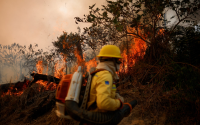15 January 2006DNAChris Hails
The year 2005 was characterised by natural disasters. Since the 2004-end Sumatran earthquake that caused the tsunami and killed lakhs of people and displaced millions of others from their homes, we saw Hurricane Katrina in the US, floods in Europe, forest fires in Spain, and then earthquakes again in Indonesia and Pakistan.
Nature's overwhelming power would seemingly render us helpless.
However, post-Tsunami investigations showed that an intact, stable and resilient environment at places far from the epicentre provided a vital cushion to the deadly waves —mangroves in Thailand, vegetated sand dunes in Sri Lanka, and fringing reefs around many of the Indian Ocean's low-lying islands prevented further tragedy. On the other hand, at places where coastal defenses had been degraded by human activity, the damages were far greater.
Evidently, maintaining the environment is integral to the planet's survival. This year, therefore, presents one of the greatest challenges to mankind.
Climate change is perhaps one of the greatest threats to our survival. The 2005 Kyoto Protocol is the first real international instrument to tackle climate change through the collective reduction of greenhouse gas emissions. Many governments, unfortunately, are reluctant to come to grips with the global climatic changes, giving affordability as an excuse.
The UN took the threat seriously, establishing a high-level panel on challenges to global threats and security. But, the panel's report ducked real recommendations about what to do even as it assessed what is going wrong.
When Hurricane Katrina struck New Orleans, we thought we had the engineering prowess to build a city on a silt-based river delta, interrupting the natural deposition cycle and lulling hundreds of thousands of people into the false sense of security. Couple that with extracting oil and gas from below the delta and add to it years of draining the natural wetlands and coastal marshes, it was a recipe for disaster. We knew all that, but a 1998 programme to restore Louisiana's coastal marsh system was never adopted. Why? The US$14 billion price-tag was too high.
That cost seems negligible compared to the US$125 billion damage that Katrina caused, the US$50 billion repair bill, and the 1,000-plus priceless lives lost.
To best mitigate future extreme events, the international community will have to start making more strategic and cautious decisions.
A stable, sound environment will not guarantee safety in the wake of colossal natural disasters — like the Asian tsunami or American hurricane — but the evidence is there before us that it reduces the risks.
The evidence is also there that our aspirations for the future cannot be met unless we start to tread more gently upon the thin crust of the sphere upon which our lives depend, and take better care of the atmosphere that sustains us.
Dr Chris Hails is Conservation Programme Director at World Wide Fund for Nature International, based in Gland, Switzerland.






